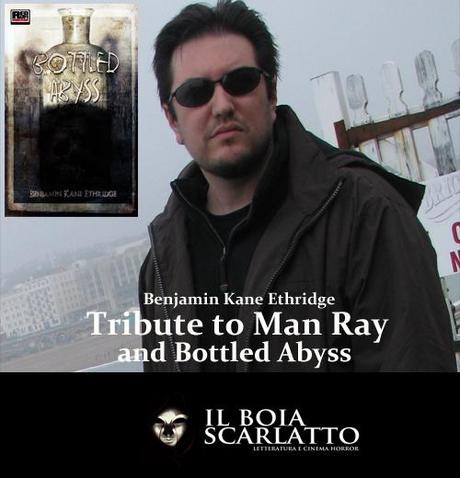 Con Benjamin Kane Ethridge ci conosciamo da tempo, prima che vincesse il Bram Stoker Award nell'edizione 2010, per la categoria miglior primo romanzo, con Black And Orange. Abbiamo iniziato a collaborare per alcuni progetti, il suo racconto inedito The Piece cast down è stato pubblicato nella raccolta da me curata Queen Anne's Resurrection - I Demoni del Mare (Mezzotints Ebook), pubblicata nel dicembre scorso. Oggi mi trovo a collaborare in modo ancora più stretto con l'autore: Benjamin ha recentemente concluso per Mezzotints Ebook l'editing della raccolta di racconti Black Tea and other tales di Samuel Marolla, in uscita a fine febbraio. Ma continueremo a lavorare insieme per l'editing dei titoli in inglese di Mezzotints Ebook. Mi ha fatto molto piacere leggere il nome di Benjamin tra gli autori in ballottaggio per l'edizione in corso del Bram Stoker Award, per la categoria "regina", miglior romanzo, con il suo ultimo lavoro Bottled Abyss.
Con Benjamin Kane Ethridge ci conosciamo da tempo, prima che vincesse il Bram Stoker Award nell'edizione 2010, per la categoria miglior primo romanzo, con Black And Orange. Abbiamo iniziato a collaborare per alcuni progetti, il suo racconto inedito The Piece cast down è stato pubblicato nella raccolta da me curata Queen Anne's Resurrection - I Demoni del Mare (Mezzotints Ebook), pubblicata nel dicembre scorso. Oggi mi trovo a collaborare in modo ancora più stretto con l'autore: Benjamin ha recentemente concluso per Mezzotints Ebook l'editing della raccolta di racconti Black Tea and other tales di Samuel Marolla, in uscita a fine febbraio. Ma continueremo a lavorare insieme per l'editing dei titoli in inglese di Mezzotints Ebook. Mi ha fatto molto piacere leggere il nome di Benjamin tra gli autori in ballottaggio per l'edizione in corso del Bram Stoker Award, per la categoria "regina", miglior romanzo, con il suo ultimo lavoro Bottled Abyss.
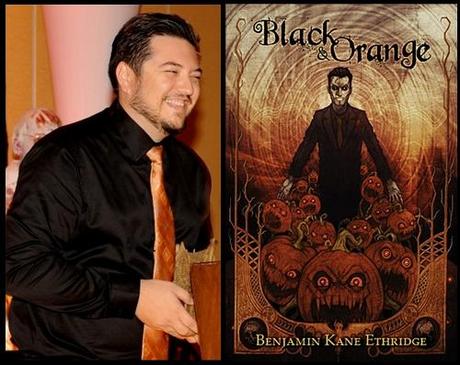 La prosa di Benjamin respira grande lirismo, specie nella narrativa breve dove l'autore presenta squarci di poesia che definireil, senza paura, "surrealista". Questi affascinanti inserti mi hanno sempre colpito, e ho chiesto a Benjamin di interpretare con uno short l'opera di Man Ray, grande fotografo e artista surrealista. Catturare l'anima di Ray, della sua complessa visione artistica, attraverso poche parole, non è cosa semplice, ma Benjamin ha raccolto la sfida, a modo suo. Io pensavo mi presentasse un breve racconto, ispirato all'immaginario di Ray, ma mi sono trovato a leggere una splendida interpretazione di poesia surrealista, dal titolo Blackened White. Un pezzo affascinante, emozionante, che non ho voluto tradurre in italiano per non trasformarlo, necessariamente, in qualcosa di diverso, di estraneo. La musica delle parole e dei pensieri di Blackened White la trovate dunque sotto, intatta come l'autore l'ha pensata, ispirato dall'arte di Man Ray.
La prosa di Benjamin respira grande lirismo, specie nella narrativa breve dove l'autore presenta squarci di poesia che definireil, senza paura, "surrealista". Questi affascinanti inserti mi hanno sempre colpito, e ho chiesto a Benjamin di interpretare con uno short l'opera di Man Ray, grande fotografo e artista surrealista. Catturare l'anima di Ray, della sua complessa visione artistica, attraverso poche parole, non è cosa semplice, ma Benjamin ha raccolto la sfida, a modo suo. Io pensavo mi presentasse un breve racconto, ispirato all'immaginario di Ray, ma mi sono trovato a leggere una splendida interpretazione di poesia surrealista, dal titolo Blackened White. Un pezzo affascinante, emozionante, che non ho voluto tradurre in italiano per non trasformarlo, necessariamente, in qualcosa di diverso, di estraneo. La musica delle parole e dei pensieri di Blackened White la trovate dunque sotto, intatta come l'autore l'ha pensata, ispirato dall'arte di Man Ray.
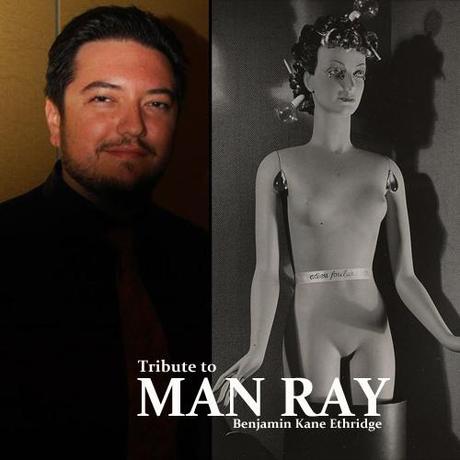 Blackened White
Tribute to Man Ray
by Benjamin Kane Ethridge
Once a statue, cunning and sad, young in creation and yet ancient in mind, sprang and lifted into the peril that was its life, and this was on one extraordinarily common day, alone in a darkling world of shadow-twisting rock, moonbent glass and rippling sour waters, the living dead world where the statue toiled without relief to bring about something living besides its sad sorry self, and it was on that same very day a terrible meteor storm inflicted itself upon the glass sky, forcing the statue to shelter the luminescent white creation of sparkling flesh, all the while looking up to cracks forming (jagged, jagged, jagged) across the sky, those injuries that would momentarily lead to the total rending of its limbs and torso into chalky divisions; the horrid tragedy of the morning left its creation—this startling beautiful creature— alone, and she was loath to remember staring into that dying stone face, just before the largest shard whistled down from the heavens and severed head from neck, the glass point sticking into the ashen ground, which would be the place, her favorite spot in fact, where she would often rest the severed head before her, looking at the similarity between her own face reflected in the tall glass shard and the stone visage between her silken hands, the maker and the made, and too many times she would fall asleep like that, a black and white eclipse just before her eyes shut and the melancholy dreams of a bright future unfolded.
Spero abbiate apprezzato questo esempio di short surrealista composto da un autore di narrativa horror. Avete capito bene: questo articolo di oggi vuole rappresentare una provocazione, diretta a chi pensa (e scrive) che la narrativa horror sia semplice letteratura d'intrattenimento, di serie B, con autori che non possiedono capacità artistiche di un certo livello o l'ambizione di comunicare qualcosa di importante. Uscendo dalle semplificazioni, dal ghetto delle etichette, nella letteratura horror potete trovare grandi soprese, non solo sangue e violenza tout court. L'horror, non mi stancherò mai di scriverlo, è una grande metafora del mondo dello sconosciuto, delle radici del male e dell'incoscienza (tornando al surrealismo) che si estendono nel nostro lato oscuro, onirico, poco soprannaturale e molto umano. Se di paura si può parlare, per questo genere di narrativa, è quella di scoprire troppo di noi stessi, della nostra esistenza archetipale e psichica che è trasparente, invisibile, se si usano solo gli occhi dell'apparenza. La letteratura horror ci consente di usare altri occhi; il soprannaturale, il mostruoso, (nelle grandi opere) è semplicemente un ombra e una mutazione di noi stessi, della quale a volte riusciamo a sentire il respiro, i muscoli, la leggera e oscura presenza.
Tornano a Benjamin Kane Ethridge, ho voluto approfittare della sua disponibilità per pubblicare il primo capitolo del suo nuovo romanzo, Bottled Abyss, come dicevo opera in ballottaggio alla edizione in corso del Bram Stoker Award come miglior romanzo. Ci caliamo dunque nella piena attualità, credo che sia una bella opportunità entrare nelle prime stanze di quest'opera, che dai segnali che mi arrivano, ha molte possibilità di successo, almeno per arrivare alle nominations ufficiali che saranno presto rese note. Vi lascio alla lettura del primo capitolo di Bottled Abyss, in lingua originale, una fotografia della prosa di Ethridge e del suo approccio "surrealista"
Blackened White
Tribute to Man Ray
by Benjamin Kane Ethridge
Once a statue, cunning and sad, young in creation and yet ancient in mind, sprang and lifted into the peril that was its life, and this was on one extraordinarily common day, alone in a darkling world of shadow-twisting rock, moonbent glass and rippling sour waters, the living dead world where the statue toiled without relief to bring about something living besides its sad sorry self, and it was on that same very day a terrible meteor storm inflicted itself upon the glass sky, forcing the statue to shelter the luminescent white creation of sparkling flesh, all the while looking up to cracks forming (jagged, jagged, jagged) across the sky, those injuries that would momentarily lead to the total rending of its limbs and torso into chalky divisions; the horrid tragedy of the morning left its creation—this startling beautiful creature— alone, and she was loath to remember staring into that dying stone face, just before the largest shard whistled down from the heavens and severed head from neck, the glass point sticking into the ashen ground, which would be the place, her favorite spot in fact, where she would often rest the severed head before her, looking at the similarity between her own face reflected in the tall glass shard and the stone visage between her silken hands, the maker and the made, and too many times she would fall asleep like that, a black and white eclipse just before her eyes shut and the melancholy dreams of a bright future unfolded.
Spero abbiate apprezzato questo esempio di short surrealista composto da un autore di narrativa horror. Avete capito bene: questo articolo di oggi vuole rappresentare una provocazione, diretta a chi pensa (e scrive) che la narrativa horror sia semplice letteratura d'intrattenimento, di serie B, con autori che non possiedono capacità artistiche di un certo livello o l'ambizione di comunicare qualcosa di importante. Uscendo dalle semplificazioni, dal ghetto delle etichette, nella letteratura horror potete trovare grandi soprese, non solo sangue e violenza tout court. L'horror, non mi stancherò mai di scriverlo, è una grande metafora del mondo dello sconosciuto, delle radici del male e dell'incoscienza (tornando al surrealismo) che si estendono nel nostro lato oscuro, onirico, poco soprannaturale e molto umano. Se di paura si può parlare, per questo genere di narrativa, è quella di scoprire troppo di noi stessi, della nostra esistenza archetipale e psichica che è trasparente, invisibile, se si usano solo gli occhi dell'apparenza. La letteratura horror ci consente di usare altri occhi; il soprannaturale, il mostruoso, (nelle grandi opere) è semplicemente un ombra e una mutazione di noi stessi, della quale a volte riusciamo a sentire il respiro, i muscoli, la leggera e oscura presenza.
Tornano a Benjamin Kane Ethridge, ho voluto approfittare della sua disponibilità per pubblicare il primo capitolo del suo nuovo romanzo, Bottled Abyss, come dicevo opera in ballottaggio alla edizione in corso del Bram Stoker Award come miglior romanzo. Ci caliamo dunque nella piena attualità, credo che sia una bella opportunità entrare nelle prime stanze di quest'opera, che dai segnali che mi arrivano, ha molte possibilità di successo, almeno per arrivare alle nominations ufficiali che saranno presto rese note. Vi lascio alla lettura del primo capitolo di Bottled Abyss, in lingua originale, una fotografia della prosa di Ethridge e del suo approccio "surrealista"
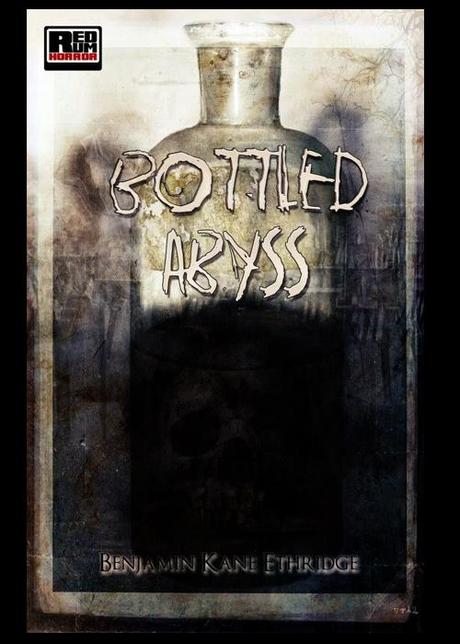 Bottled Abyss
Chapter One - The Coins
by Benjamin Kane Ethridge
Herman watched the caramel colored whiskey flow down the neck of the bottle to Janet’s pressed lips. Her brown eyes filled and she set the Jim Beam down on the cigarette ash spotted TV tray. “I’m going to kill myself today,” she told him.
Bottled Abyss
Chapter One - The Coins
by Benjamin Kane Ethridge
Herman watched the caramel colored whiskey flow down the neck of the bottle to Janet’s pressed lips. Her brown eyes filled and she set the Jim Beam down on the cigarette ash spotted TV tray. “I’m going to kill myself today,” she told him.Herman had just put on his windbreaker to leave and had one arm stuck into a sleeve at a bad angle. “You’ve said that before,” he replied.
Janet’s eyes seemed near to shutting; it was difficult now to discern their normal weight from the burden of drink. They’d sagged that way for almost a year now, that slight thinning of the vision, like someone sleepwalking or struggling to read an eye chart. She placed a hand back on the whiskey but thought better of taking another tug.
“Don’t drink any more today, okay?”
It took him a moment to remember what he’d been doing before he gently wiggled his arm inside the sleeve. He was getting so damned fat. Soon double extra large would be worn not for comfort but necessity. Going back to the weight room might have been good for him, but he’d just not found the time between jobs.
“Where are you going?”
“To the foothills. Lester’s out there somewhere.”
“Sure he is,” Janet answered with a sick twist of her mouth.
“Are you taking your pills?”
“All of them.”
He waited for her to give herself away. Janet did not elaborate, however, and instead tapped listlessly on her yellow teeth. He remembered her bright white smile once upon a time and wasn’t sure when it had changed. She used to brush after every meal and floss twice a day. The teeth-tapping was something she’d started to do recently and it could last sometimes for several hours. She wouldn’t say anything during these events. Just tap, tap, tap, tapping; eyes wide and overflowing with emptiness, scarce moments taken for blinking; knees locked to her chest. A flashback normally triggered this fugue state.
Just last month, Herman had gotten her to finally tell him which haunted moment was paralyzing her. It wasn’t at all what he guessed. It wasn’t that awful first day, nor was it the day following the hit and run, when the doctor let them into the operating room to be with her.
The moment their Melody was gone forever.
No, the recollection was when they spread some of her ashes at Greenhill Pond, a benign event for Herman, but obviously one capable of serious damage to Janet.
He did have his memories of that day, though.
That duck stuck its head through the ashes.
It didn’t. I can’t take this. Just stop talking.
You didn’t see? It has her ashes on its feathers now. Why did it do that?
Herman shook away that thought. His daughter had been too much in his mind this morning. It wasn’t healthy. People still had to live, didn’t they? People had to carry on after a tragedy, not make it grow into some gigantic life-ending monster. There was work to do. Bills to pay. Air to breathe. And runaway Border Collies to find.
“When was the last time you saw Lester?” he asked.
Tap, tap, went Janet’s teeth.
Tap.
“Did you let him out to pee?”
Tap.
“Did he already get his wet food? You know he’ll be back if he’s hungry.”
Tap-tap-tap-tap.
“He probably isn’t much farther than the dirt bike trail. He never goes out that far.”
Janet stopped tapping and Herman froze. He would take any break in pattern as a good sign. She looked at him squarely and the tip of her tongue glided over her teeth. In an instant, she took another sip of the Jim Beam.
Herman took his keys off the top of the oak entertainment center.
“The dog’s gone,” she said. “Don’t bother. The coyotes were howling all last night. He’s not coming back. I know I wouldn’t.”
“You should start tidying up. Evan and Faye are going to make us dinner tomorrow.”
“You aren’t working?”
“I can go into the shop late. They don’t care.”
“I don’t want to be alone right now. Stay.”
“I need to find our dog, Janet.”
She gave him one of her recent inappropriate looks, layered in drunkenness. “I… want you.”
Herman snorted resolutely and went over for the bottle. Janet put it behind her back, crushing it between her and the sofa.
“Give it.”
She looked away, far away.
He tried to work his hand around her body to get at the bottle, but she thrust herself back, reflexively poking her elbows down. Herman pulled back with a tired sigh.
“I hate you sometimes,” she whispered.
“I don’t really give a shit.” He left her for the kitchen. He could hear her weeping softly in the next room. She responded fairly well to being comforted now, and although he might have taken a chance at mending her mood, he didn’t want to look at her another second. He grabbed Lester’s jerky snacks from the counter, from the junk drawer a leash, his cell phone and a flashlight from the cupboard, then from the fridge a bottle of water.
Outside on the porch, Herman checked the door to make certain the lock really was engaging. Strange that he did this, for the most dangerous thing that could befall Janet was really in here already, with her.
He set out across the sun-bleached yard and left the gate open, in case his dog showed back up before he did. Sunlight funneled down a long break between the rocky foothills. The afternoon was growing older. Dusk would be here soon enough. He’d have to figure on turning back at a good time if he didn’t want a long nighttime stroll through the desert.
Lester’s coat was blacker than it was white, so distinguishing his shape out here in the Southern Californian wasteland would take eagle eyes. Herman couldn’t believe the dog hadn’t come right back after a couple of hours. But then he had no clear idea when Lester had gone missing because he’d been working. On a regular day he volunteered as a mechanic at the water treatment plant from four to about ten in the morning or so, drove into Redlands for his shift at Jorge’s Burgers around noon. After a full eight hour shift there he’d return home for dinner, smelling like a six foot fried zucchini, and then he was off to the body shop from nine until midnight. But the shop only called him when they had large rush jobs for insurance companies.
Today wasn’t one of those days and he’d dreaded coming home to spend a full evening with Janet. Morbidly, he was almost grateful to get out of the house. He knew it wasn’t good to think like this though. Lester could be hurt out here. A snake could have bitten him, a coyote could have gotten at him, he could have broken his legs falling down a ravine. The world’s stage did awful things to its best players. Herman counted on that now. He figured anyone would, had their two year old daughter been run over by a getaway car. In a better universe, Melody should have been safe playing in the front yard with other children in her daycare. Those murdering immoral assholes should have found another residential street to speed through after they robbed that bank. They shouldn’t have taken that corner so sharp and gone up over the sidewalk—
Herman whipped his head from side to side.
This was what hanging out with Janet would get you. For even half an hour, it was like being tossed into a dumpster with every other nightmare he’d tried to throw away. Most of the images burned into his mind he thought would heal if he just ignored them long enough. The method was cowardly and overused, but Herman could not deny how effective it was, at least until his wife decided to have one of her tapping fits and then his own bad images and ideas would start to surface.
What would it be this time? The spanking he gave Melody the morning of the day she died? Her bent, pouting lip and watering eyes as he scolded her for leaving toys in the bathroom when he’d told her three times before? The way he kicked her purple rubber ducky into a corner and startled her?
Or would it be the big unanswered question? When he dropped off Melody to daycare, had he still been grumpy with her? He couldn’t remember if he’d made up with her or not. That memory was gone.
He had held grudges in the past. He could remember times when he dropped her off and didn’t say a word. He could recall being stern, being sour. Melody would give him a hug and tell him goodbye and he would say nothing in return; he wanted her to understand the value of upsetting him. Had the day she was hit by the car been one of those days?
Or had he let it go?
Had Herman told her he loved her and to have fun playing with the other kids?
How long did a two-year old harbor shame for disappointing a parent?
Did she feel, in those moments before passing away, that the car had been some sort of punishment?
Herman closed his eyes, swam in the maddening sadness for a moment, and then shook his head until it made him dizzy. He staggered through the dirt and a pebble went inside his tennis shoe. Stooping, he fished for it with his finger.
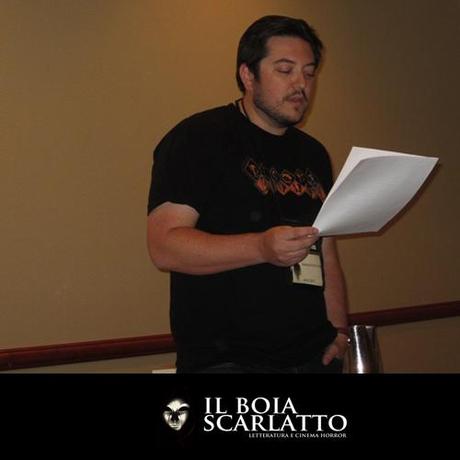
The desert expanded before him in all its miserable beauty. Stumpy trees lined a couple ridges, their leaves bursting in full, trying so urgently to be vibrant, but instead possessed a chalky, lusterless avocado color. Shallow lavender puddles of wild flowers contrasted with long stretches of similarly self-loathing gray scrub, as though to reinforce the bone-deep ugliness in everything else.
The rock in his shoe had evaded Herman, but he couldn’t feel it digging into him any longer. It was like it wasn’t there.
He started off again in the direction he thought Lester might have gone, this time at a stronger pace. The land descended into a basin that came sharply together in a collection of weeds. He hopped over and through some of the thorny underbrush and continued out onto a new plateau of hard, colorless sand, only occasionally interrupted by distant brown sugar dollops of tumbleweeds.
The first paw print he found just at the base of a serpentine washout of pebbles and grit, the dirt rippling there like a freeze-frame shot of a dirty river.
“Lester!” he hollered.
He called again.
Herman searched out the direction of the paw prints, though the path wasn’t explicit like in the movies; the prints often disappeared, were half-formed, or extremely faint, causing him to second-guess whether some weren’t just random disruptions of earth. He went where he ultimately thought they might lead, in a direction that took him south, toward the foothills.
He tried to whistle, but had never been much good at it. Lester hadn’t ever been extremely responsive to high pitched sounds anyway. The vet said he had hearing loss, likely from some event in his puppyhood before Herman and Janet adopted him from the shelter. After Melody’s death, he felt like they never gave Lester all the attention he needed. This escape wasn’t the first and if they continued to shuffle about the house with their eyes always turned inwards, it probably wouldn’t be the last.
Herman made a vow to not let that happen.
“Lester!”
Only the slip-sliding wind again.
Herman hurried on, thinking of drinking from his water bottle, and then dismissing it as being fidgety. A mile off he could see the procession of electricity transmission pylons marching into infinity, a gang of defunct robot warriors.
There was another paw print in an area where shadows crossed the earth in lengthy swatches. Herman followed the illogical trajectory of the prints for a few steps when he heard the call. The sound was goat-like and miniscule. He attempted to track its location, absurdly by pulling open his left ear. It seemed like it would work. The bleating came again and he quickly scaled a dune popping with soft, grainy weeds.
The bleating again. Once more. Louder? Closer? He wasn’t certain if he was getting anywhere near it.
He searched the land before him, wondering momentarily if his vision had deteriorated since his thirtieth birthday. He drew near an old rowboat half buried in the sand. Some of its wooden siding had been stripped away, making its exposed end look like the ribs of some paleontology discovery. The darker sand surrounding the boat had the unsettling look of eyeless faces screaming silent screams. Lester’s paw prints tracked through the faces, blurring some of their misery.
The bleating sound bent into a yelp that was undeniably canine.
Herman raced up an incline slashed with brittle vegetation. Just at the other side, the earth fell away in moist clumps. His ankle twisted a bit, but he kept on anyway. The next call came out, a snapping vicious growl-bark-yipe.
The foothills slowly embraced him with their craggy arms, the sun completely hidden now. He could distinguish the large open mouth of an abandoned mine shaft he didn’t recognize. Hiking on the other side of the hills, he had seen a couple of older mining shafts where teenagers had bonfires, but it was odd to find one so isolated from the others.
Just as he began hoping Lester hadn’t gone into the shaft, another cry of animal pain registered from the other side of the hill. Herman felt his mouth go dry. That one was close. He wanted to convince himself the cry had not sounded like his Border Collie, but he couldn’t delude himself.
He crossed over to a series of snapping jaws and growls. Lester lay on his side, paws up, fangs bared. His black fur was shiny with blood. Two coyotes rounded him, only to then switch postures on hearing Herman breaking down the slope. The pair of scrawny fiends took off. He tried to kick one as it shot past him, but it was quicker than him by far.
Lester rested his head and wagged his tail as Herman approached.
He dropped to his knees. “No, please, no...”
The dog, tail wagging, mouth gasping for air, didn’t seem to mind its predicament. Herman took out his water bottle, twisted off the cap and poured water over the bloody fur around its neck. Water and blood mixed pink on the badge of white on Lester’s cheek. Carefully, Herman lifted up some of the fur. It was too messy to really see any wounds.
The dog tried to raise its head and whined.
“It’s okay, buddy. I’m going to help you. Hang in there.”
Herman took out his cell phone and dialed Janet. He was only getting one bar of reception out here, but that should have been enough to call home.
Janet picked up.
Her voice was a radio transmission from Hell. The phone reception garbled and flexed and fauceted sound in torrents. Herman attempted to talk through it, but then the call was lost.
He called back.
Lester yelped and Herman pulled his fingers away from his wounds.
The next call didn’t go through.
Could you call 911 for a dog?
In the face of escalating doubt, Herman dialed and waited. His phone returned a signal transmission error. He squeezed the phone hatefully before shoving it back in his jeans.
“I’m going to have to carry you, buddy.” Herman went down on his haunches and slid one hand underneath Lester and at once felt a surge of blood around his fingers. As Herman drew his hand back, Lester snapped with a fierceness he’d never seen from the dog before. He scooted away in a rustle of dirt. “It’s okay, boy. It’s okay.”
His mind raced so fast it took a while to even define the problem. Lester was still alive, but his breathing was shallow. He was losing a lot of blood. If he left to go get help, there would be no saving the dog.
Lester whined again, as though sensing the same thing now. His eyes were wide and frightened, though his open, panting mouth betrayed him for a smile.
Herman slipped off his windbreaker and bent over the dog. He pushed the sleeve under Lester’s mouth, then took both ends and drew it around the neck. Lester snorted but made no other attempt to snap. Herman tied the sleeve together with the other sleeve, to a point where he felt it was secure but not strangling. After he was done, he looked disparagingly at his vermillion hands.
It always looks like there’s more blood than there is—isn’t that what they always say? Herman wondered if “they” weren’t just chockfull of shit, but he hoped not.
He stood and the world blackened. His heart quaked and thundered and pounded and slammed inside his chest. Should he try to move the dog again? What if that made him bleed faster? Maybe he could just run until he got a better signal on his phone?
Lester’s breathing came slower now; it wasn’t as wild and labored, it was more deliberate, it was a last call for oxygen.
“I’m going to get help, Les,” said Herman. He could hear a tremor in his voice. God, he was so tired of the man he’d become this past year.
He took a couple timid steps away and Lester started whining deep from the gut. Herman closed his eyes and took another step away. This life…oh this life…all of this in a year. In a fucking year. This wasn’t really happening, was it? People don’t suffer this much? Do they?
A rustling came from behind him.
“Is there trouble here?”
Herman turned. Parting the weeds with a dark walking stick, a gaunt middle aged man with long strawberry blond hair came into the clearing. He was dressed in a black sweat shirt and jeans that almost appeared to blend into one another like a robe. His dirty boots crunched the gravel softly and the sound stopped when he saw the dog.
“My,” he said, pyrite eyes studying the scene.
“It was coyotes—do you have cell service out here?” asked Herman.
The man hesitated, then pulled his eyes away from Lester. “I’m afraid not.”
“Can you go for help? I don’t want to leave him.”
“Of course. I was a medic once, a long time ago. Would you care for me to have a look first?”
“Oh God yes, please, thank you.”
The man dropped his walking stick back against the weeds, which kept it standing. The stick came down into a thin paddle at its end, almost making resemble an oar. Herman had never seen one like it before. Must have been handmade.
He shook the man’s ice cold hand as he walked by. “Thank you for helping. I’m Herman Erikson.”
The man mumbled something that sounded like Charleston and then got down next to Lester. “You mind gripping the fur behind his neck, keep him from biting me?”
Herman knelt and grabbed a wad of Lester’s dusty black fur at the back of his neck.
The man leaned over, blond ponytail hanging off his shoulder, and slowly stripped away the hasty windbreaker tourniquet. When he saw the blood he blew out of the side of his mouth and his eyes worked back and forth for a minute.
“What?” Herman asked.
“There’s a bulging here and here—I think maybe that’s internal issues. I don’t know with dogs. He’s pretty well chewed up. This needs to be shaved, cleaned up and evaluated. Have you tried to move him?”
“He’s wounded on his side too. I felt…something there.”
Charleston’s eyes fixed on him a moment and it was a little unsettling. “Can I see?”
“Yes, go ahead,” said Herman.
The man gently lifted the dog’s hind quarters. Lester made a miserable squeal. After a moment’s study, he let him gently down.
“That’s even worse than the throat. He’s keeping himself together by laying on it. Too bad, such a beautiful, beautiful hound. How much did you pay for him?”
Herman shook his head, taken back. “We got him at a shelter.”
Charleston looked at him a moment as though he hadn’t understood, but said, “I see.”
“So what can I do? Anything?”
The man took a long breath of air in through his sharp nose and pursed his lips in thought. “This one’s suffering…well enough, and dragging him a mile or two will probably be worse. You could chance it, possibly.”
“My wife can’t see him like this.”
“I understand.” Charleston got to his feet and dusted off his knees. “I’ll go ahead and head out to the main road over there. I’m not a fast traveler but I can probably make it in less than an hour or so.”
“That won’t do. Maybe I should just go. Thank you for helping.”
“It’s no problem, friend.”
Herman faded back a little bit, shaking his head. Lester’s eyes were glazing over. Herman couldn’t watch this anymore. He took one more step back and bumped into Charleston.
“Pardon—”
The man’s gold-flaked eyes stared into him, hard. “There’s one more thing. Not proud to say it, but I have some… liquid poppy with me.”
“Morphine?”
“Of course, of course. I will give some to the dog, if you like.”
Herman’s first instinct was to say no, but his merry-go-round head could not find a good reason for it. “He’s not going to make it. I guess that would be okay. He’s in pain. It’ll help right?”
“It will help,” Charleston said.
From inside the front pouch of the man’s sweat shirt, he pulled free an obsidian bottle. Its patina would suggest a metal composite material, although the long flutelike neck ended in a flat, circular opening which revealed the interior as glass. The bottle, without a doubt, was an archaic looking item for a hiker to carry. Herman didn’t want to ask what the deal was at this point, for fear of embarrassing the man, but he was beginning to form an impression of Charleston. He’d met a man who was likely an oddball coot that wandered the wastelands out here, as high as Benjamin Franklin’s electrified kite.
“That’s a beautiful bottle,” remarked Herman. He meant it, too. What he didn’t say was the bottle was also equally troubling for some reason.
“Thank you.” Charleston took a knee once more near Lester. “It’s all I have of my old home. The poppy helps my back pain and the bottle helps me remember everything that used to be good. Do you have anything like that, friend?”
Herman did indeed, but such items were landmines hidden around the house that he’d rather not encounter. “Sure,” he answered.
The man pulled out the longest, blackest cork Herman had ever seen and set it down on the pebble-shot desert floor. Lester took deeper breaths. His eyes bulged as the man tipped the bottle. Dark gray water poured from the bottle’s indifferent mouth and splashed all over Lester’s face. The dog lapped at the stream and choked raggedly.
“Hey!” Herman stepped forward.
Charleston ignored him and recorked the bottle. “Easy. We all have the fullness of life pouring out of us,” he whispered, “until there is little to nothing of us left.”
“What in the hell was that shit?”
Lester heaved and gagged and smacked his jaws together at what might have been a bad taste. The dark liquid from the bottle had not stained his black and white face. In fact, Herman couldn’t see any evidence that anything had spilled on the dog. The fluid had appeared to be the consistency of water, so it couldn’t have sloughed off; it had to have been absorbed.
Hornk.
A sudden blast of black vomit came from the dog’s mouth. When it reached the ground, however, it looked as though Lester had puked out an old coin.
Charleston brushed it off and took a moment to study it. The coin’s edges were worn and there were long cracks from its perimeter almost down to its center. The imprint in the center resembled a skull of a dog.
“I’ve been looking for this.”
Herman noticed his jaw was hanging open then. “Is… that yours? Didn’t he…? I mean…”
Charleston got to his feet and slipped the bottle in his front pouch and the coin in his black pants. The man’s face, skeletal and parched, turned away. “He feels no pain now. Take him from here now and never come back.”
“Did my dog cough that coin up? Or am I nuts?”
“You are upset.”
“Really? But that’s crazy… Can I see the coin?”
“It doesn’t concern you, friend. Like I said, take your hound.”
“I can’t take him—”
But when Herman looked down, Lester was looking up expectantly. Blood still ran from his neck, but he had that alert expression dogs get when they’re ready to go running.
“Hey Les,” he said, “did that stuff already make you feel better, boy?”
Lester gave a jubilant bark.
Herman bent down to pick the dog up. When he did, he saw the weeds swaying as Charleston escaped back through them, his walking stick held above him like a ceremonial staff in a religious procession.
You’re a weird one, but thank you. Lester might have been dying, but he couldn’t feel the terrible journey, and that was more than Herman could have asked for just half an hour ago.
Lester was incredibly light. Holding the dog in front of his chest, Herman could feel blood seeping out of his body and absorbing into his t-shirt, running down into his pants and underwear. Lester rested his snout on Herman’s shoulder and made no struggle to be put down. They walked on, together, friends to the last.
It was halfway back when the bleeding stopped and Lester’s breathing calmed.
And it was when they got back to the yard when Herman realized the dog’s wounds had closed, and healed. Bottled Abyss è disponibile gratuitamente in formato kindle: potete scaricare il romanzo, ancora per poche ore, su Amazon...se fate in tempo approfittatene.
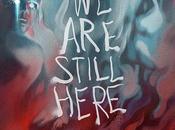
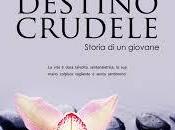
![[Rubrica: Italian Writers Wanted #12]](https://m22.paperblog.com/i/289/2897898/rubrica-italian-writers-wanted-12-L-cIVqIF-175x130.png)



